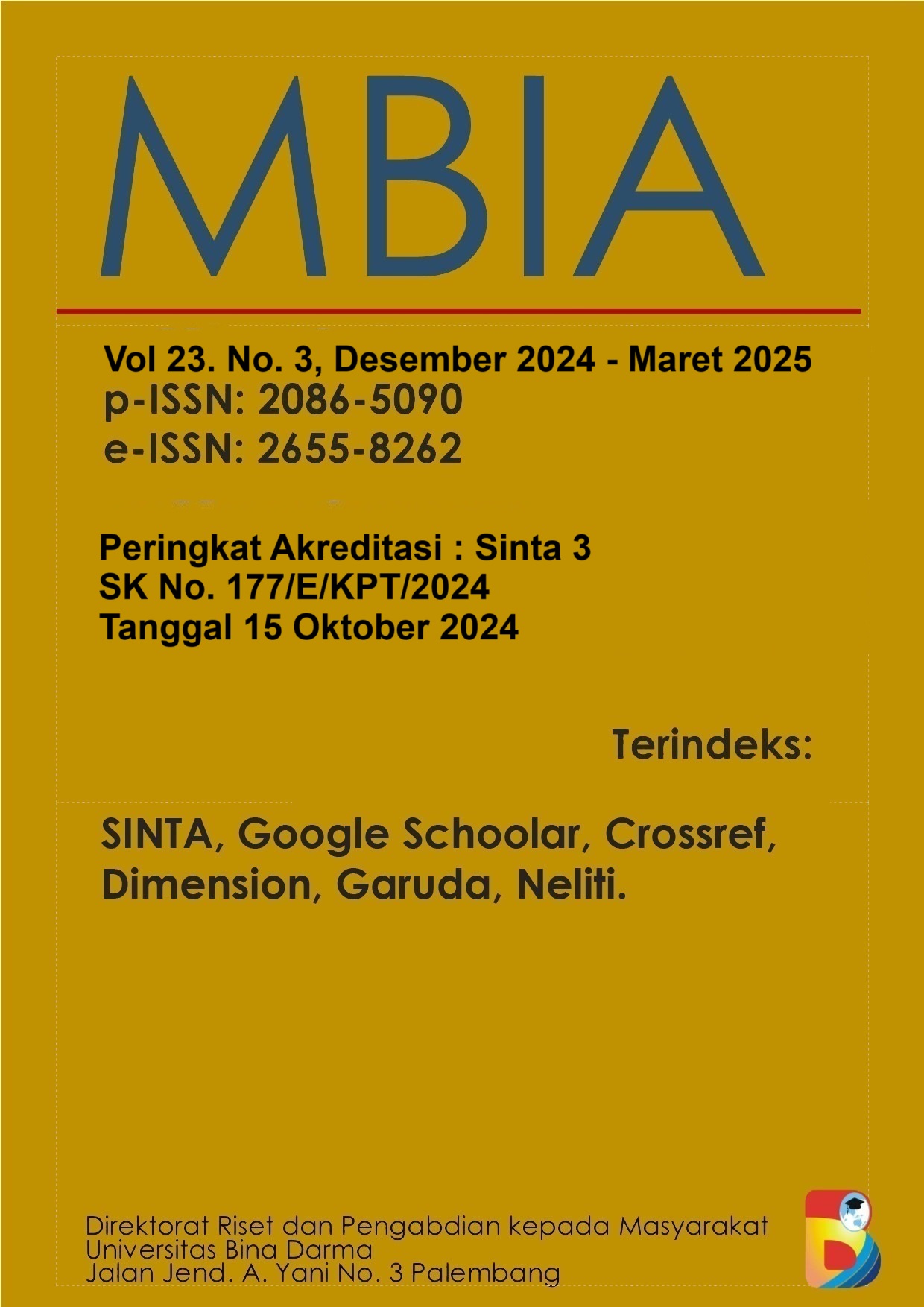Peran Big Data Dan Artificial Intelligence Dalam Optimalisasi Pengawasan Pajak
DOI:
https://doi.org/10.33557/cw2tyd15Keywords:
Big Data, Kecerdasan Buatan, Kepatuhan PajakAbstract
The integration of Big Data and Artificial Intelligence (AI) into tax supervision has significantly improved anomaly detection and compliance monitoring. This study examines the application of these technologies across 12 countries, highlighting their influence on modern tax governance. The findings reveal that AI-driven models enhance the accuracy of tax anomaly detection by 40–78% in countries with a digital maturity index above 0.65 but show limited improvements of only 12–15% in contexts with fragmented infrastructure. Critical success factors include the availability of well-labeled historical datasets, the analytical capacity of human resources in interpreting machine learning outputs, and regulatory frameworks that support algorithmic audits. A hybrid federated learning model combined with blockchain was found to boost detection accuracy while reducing central computing requirements by 35%. This research extends the Technology–Organization–Environment (TOE) framework by underscoring the pivotal role of data governance in digital economy taxation. Strategic recommendations include the development of integrated tax data lakes, enhancing AI literacy among tax authorities, and establishing legal frameworks to ensure algorithmic transparency and accountability. Implementing these strategies is projected to increase national tax compliance rates by 25–40% over the next five years while mitigating risks associated with the digital divide.
Keywords: Big Data, Artificial Intelligence, Tax Compliance.
Abstrak
Kemajuan teknologi digital telah membawa perubahan signifikan dalam sistem perpajakan global, khususnya melalui pemanfaatan Big Data dan kecerdasan buatan (AI) dalam deteksi anomali dan prediksi risiko wajib pajak. Penelitian ini menganalisis implementasi teknologi tersebut di 12 negara dengan fokus pada efektivitas, tantangan, serta faktor keberhasilan utama. Hasil penelitian menunjukkan bahwa penerapan Big Data dan AI mampu meningkatkan efektivitas pengawasan pajak sebesar 40-78% pada negara dengan indeks kematangan digital di atas 0,65, tetapi hanya 12-15% di negara dengan infrastruktur terfragmentasi. Faktor utama yang memengaruhi keberhasilan implementasi teknologi ini meliputi ketersediaan dataset historis yang berkualitas, kapasitas analitik sumber daya manusia, serta kerangka regulasi yang mendukung audit berbasis algoritma. Model hybrid federated learning dengan integrasi blockchain terbukti meningkatkan akurasi deteksi anomali pajak sekaligus mengurangi kebutuhan komputasi sentral sebesar 35%. Temuan ini memperkuat teori adaptasi teknologi organisasi dengan menambahkan dimensi data governance sebagai variabel krusial dalam implementasi teknologi pajak. Rekomendasi strategis diajukan untuk otoritas pajak, pembuat kebijakan, serta penelitian lanjutan guna meningkatkan kepatuhan pajak nasional secara berkelanjutan.
Kata Kunci: Big Data, Kecerdasan Buatan, Kepatuhan Pajak.
References
Amin, R., & Lee, J. (2021). AI implementation barriers in developing tax systems. World Bank Report 8912.
Chen, X., Wang, Y., & Patel, R. (2020). Machine learning for tax avoidance detection: A cross-national study. Journal of Tax Administration, 6(3), 45–67.
Cuenca, J. S. (2021). Emerging tax issues in the digital economy (No. 2021-08). PIDS Discussion Paper Series.
Gade, K. R. (2020). Data Governance and Risk Management: Mitigating Data-Related Threats. Advances in Computer Sciences, 3(1).
Gupta, S., et al. (2021). Ethical AI frameworks for public sector data governance. Government Information Quarterly, 38(4), 101612. https://doi.org/10.1016/j.giq.2021.101612
IMF. (2021). Fiscal Monitor: Strengthening public finance through AI.
Jang, S. B. (2019, January). A design of a tax prediction system based on artificial neural network. In 2019. International Conference on Platform Technology and Service (PlatCon) (pp. 1-4). IEEE.
Mpofu, F. Y. (2024). Prospects, Challenges, And Implications Of Deploying Artificial Intelligence In Tax Administration In Developing Countries. Studia Universitatis Babes Bolyai-Negotia, 69(3), 39-78.
OECD. (2023). Digital transformation in tax administration: Global benchmark report. OECD Publishing. https://doi.org/10.1787/9789264302473-en
Pareres, S. K., & Yusuf, H. (2024). Evaluasi Sistem Pengawasan Dalam Penanggulangan Tindak Pidana Pajak Di Indonesia. Jurnal Intelek Insan Cendikia, 1(9), 5387-5397.
Quimba, F. M. A., Moreno, N. I. S., & Salazar, A. M. C. (2024). Readiness for AI adoption of Philippine business and industry: The government's role in fostering innovation-and AI-driven industrial development (No. 2024-35). PIDS Discussion Paper Series.
Satyro, W., Contador, J., & Monken, S. (2024). Technology-organization-external-sustainability (TOES) framework for technology adoption: Critical analysis of models for Industry 4.0 implementation. Sustainability. https://www.mdpi.com
UNCTAD. (2022). Digital economy report 2022: Cross-border data flows and development. United Nations Conference on Trade and Development.
Vasilyev, A., & Novikov, D. (2022). AI-powered tax administration: The Estonian model of digital transformation. Journal of Tax Technology, 3(2), 78–95.
World Bank. (2021). Digital infrastructure for tax administration in Southeast Asia. https://documents.worldbank.org
Zheng, Q., Xu, Y., Liu, H., Shi, B., Wang, J., & Dong, B. (2024). A survey of tax risk detection using data mining techniques. Engineering, 34, 43-59.
Zhang, Q., Ning, Z., Ding, X., Wu, J., Wang, Z., Tsangaratos, P.,& Chen, W. (2024). Hybrid integration of bagging and decision tree algorithms for landslide susceptibility mapping. Water, 16(5), 657. https://www.mdpi.com/2073-4441/16/5/657
Downloads
Published
Issue
Section
License
Copyright (c) 2025 Fery Corly, Sunda Ariana, Trisninawati Trisninawati, Fitriasuri Fitriasuri, Bosya Perdana, Dhimas Rosanto Saputra

This work is licensed under a Creative Commons Attribution-ShareAlike 4.0 International License.
MBIA Universitas Bina Darma Jalan Jend. A. Yani 13 Ulu Palembang 
MBIA by http://journal.binadarma.ac.id/index.php/mbia is licensed under a Creative Commons Attribution-ShareAlike 4.0 International License.











